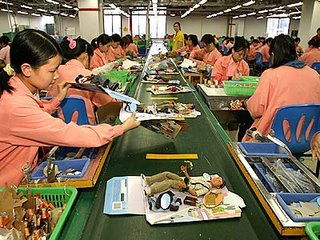. : About me : .
Name::Trade Monkey
From::Middlebury, Connecticut, United States
Email Me!
View my profile
. : Recent Posts : .
Further evidence that the Fed may be done tightening:
Google Finance Launches
Rising Wages in China
Punish Me Please!
Et Tu Francé?
That's Because They're a Pack of Pikers!
Discrepancy in USD/CAD Fundamentals
Normalizing Yield Curve?
Help With Copulas
Which Way Will the Fed Go?
. : Archives : .
February 2006
March 2006
April 2006
May 2006
June 2006
. : Tools : .
. : Fin/Econ Links : .
. : Misc Links : .
Atlas Shrugs
Belmont Club
Cato Institute
Foreign Dispatches
Instapundit
Kim Du Toit
MIT OpenCourseware
Oxblog
Protein Wisdom
Samizdata
Templates By Caz
TCS Daily
Truth on the Market
Volokh Conspiracy
**View my Wish List**
. : Credits : .
Template By Caz
Powered by: Blogger
Tuesday, March 21, 2006
Imports From China Aren't Pricier -- Yet
If the wages of U.S. workers were rising at 10% per year, you can be sure economists would be sounding the inflation alarm bells. After all, even the slightest sign of an upward surge in labor costs brings calls for the Federal Reserve to boost interest rates even faster.
But what if it's Chinese wages that are rising at a 10% pace? Should the Fed care? In the era of globalization it sometimes feels as if Guangdong and China's other industrialized provinces are extensions of the U.S economy. Indeed, the value of cheap imports from China -- about $240 billion in 2005 -- exceeds the net revenues of the U.S. securities industry. With that large an impact, it wouldn't be a surprise if soaring wages in China translated to higher import prices and faster inflation in the U.S.
But here's the surprise: For now the cost increases in China are not being passed through to U.S. prices. The latest data from the Bureau of Labor Statistics, released on Mar. 15, show that the price of imports from China has fallen by 0.4% over the past year, vs. a 1.8% rise in the price of non-oil imports from all countries. In part, rapid productivity jumps in Chinese manufacturing may be allowing employers to pay higher wages and still keep prices low.